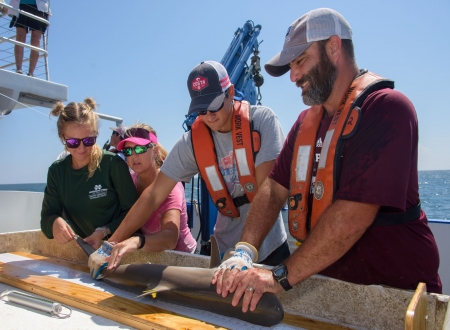
Marcus Drymon, right, MSU associate Extension professor in marine fisheries ecology, examines a shark for tags off the coast of Dauphin Island, Alabama. Drymon and Lindsay Mullins, a university Ph.D. student in marine science, had a news article in The Conversation last week based on a research study on the abundance of baby bull sharks in Alabama and Texas bays. The increase, according to the study, is explained by slight increases in temperature over the past two decades in the Gulf of Mexico. Drymon’s research has also landed him in a new National Geographic documentary “Shark Beach with Anthony Mackie” on Disney+.
Search committee in place for Bagley College of Engineering dean
Mississippi State University Provost and Executive Vice President David Shaw last Monday [July 15] announced members of the search committee for the university’s next dean of the Bagley College of Engineering. A 17-member search committee, now in place and chaired by College of Business Dean Scott Grawe (non-voting), will hold its initial meeting soon to begin the search process. The university is consulting with WittKieffer and Associates for assistance in the search process.
MSU-involved nanobiotechnology consortium enhancing Mississippi’s healthcare
Mississippi State staff and faculty are part of a statewide team tasked with enhancing nanobiotechnology and positioning the Magnolia State as a healthcare hub. The Mississippi Nano-bio and Immuno-Engineering Consortium, which includes researchers from MSU and five other Magnolia State universities, was created to enhance research and solve healthcare issues through nanobiotechnology with a $7 million grant from the National Science Foundation. As a part of this consortium, MSU is receiving $1.53 million of the grant for its portion of the work. MSU Professor of Chemistry Nicholas Fitzkee is the principal investigator of MSU’s research funding. Fitzkee said the project’s goal is to create “next-generation materials” for innovative healthcare solutions.
Electric vehicle charger donation powers up CAVS
Mississippi State University’s Center for Advanced Vehicular Systems is growing its electric vehicle power capacity thanks to a donation of two Chargepoint EV chargers from CKR Solar. “As the number of electric vehicles on the road grows, so does the need for EV infrastructure, and we appreciate this support of the EV infrastructure right here at our building,” said CAVS Director Clay Walden. “We are using electric vehicles as part of our innovative off-road autonomy research, and MSU’s EcoCAR team is pushing the limits of what a commercial EV can do. New EV chargers will help that work continue to flourish.”
Reminder: University policy addresses employee political activity
With campaigning for elected offices underway this year, Mississippi State's Office of General Counsel offers the following reminder of the university’s policy on political activities. There are several basic guidelines that university employees should keep in mind when engaging in any form of political activity. MSU employees are encouraged to review OP 01.14: Political Activities in its entirety and to understand their rights and responsibilities.
Free learning opportunities via LinkedIn Learning available to faculty, staff and students
Sharpen skills. Explore new interests. Increase professional value. These and other results are now available via no-cost learning opportunities to Mississippi State faculty, staff and students through MSU’s new agreement with LinkedIn Learning. A popular, online education platform, LinkedIn Learning’s 20,000-plus courses are available to campus via a quick login using their MSU NetID email addresses. With self-paced learning, courses are presented in various formats, including bite-sized video, audio only and in-depth content. The platform is directly integrated with Canvas, the university’s learning management system. MSU faculty can use it to supplement course material or even develop and load their own content onto the platform.
Smoke-free policy enhances healthy environment
Mississippi State University is a smoke-free campus. Official policy prohibits the use of any combustible or vapor products anywhere on campus property including university buildings, university grounds, university vehicles, parking areas and sidewalks. The smoke-free campus policy is part of the university's commitment to creating a healthy environment for all members of the campus community. Use of cigarettes, e-cigarettes, cigars, pipes, hookah or other similar devices are prohibited by this policy. The complete policy is available at www.policies.msstate.edu/policy/91301.
The Office of Public Affairs provides Maroon MEMO as a general information
resource for Mississippi State University employees.
Web links are subject to change. Submit news, questions or comments to
Jim Laird.















